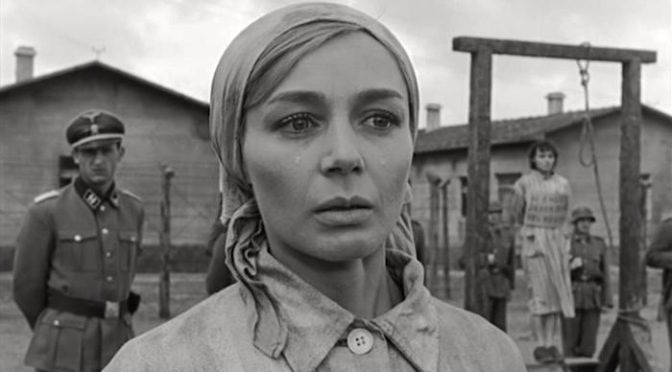Emmanuelle Riva and I were supposed to get lunch.
But the star of French-Japanese New Wave classic Hiroshima mon amour — the story of a love-affair between a French actress and a Japanese businessman scarred by the war — died Friday at 89 of health complications related to cancer.
When I found out, I was in bed in Los Angeles on Saturday at 3 a.m., briskly skimming Twitter for more news of the day — President Donald Trump’s executive orders barring citizens and refugees from seven Muslim-majority nations. Faint war drums pounding in the far-East over Taiwan, and in the Middle East over the West Bank.
And then a tweet from French presidential hopeful Emmanuel Macron: “Luminous in Hiroshima mon amour, jarring with [Michael] Haneke[’s acclaimed 2012 drama Amour]: with Emmanuelle Riva, French cinema loses one of its legends.”
I interviewed Riva for Al Jazeera America — before that died, too — for a series commemorating the 70th anniversary of the U.S. bombings of Hiroshima and Nagasaki in late 2015. It was an opportunity to speak to an idol. I’d first watched Hiroshima Mon Amour bootlegged in China, where I was studying abroad and decidedly melancholy. As an American of North African-Arab origin living in the People’s Republic, I felt myself of the East and the West. Her interaction with her male costar Eiji Okada felt like me in dialogue with myself.
Her voice at the start of that film has an incomparable sonority — a lyrical quality that enunciates and appreciates each syllable of the French and the Japanese words she uses to overlay a series of images taken after the bombing, interspersed with reenactments and a pan of Hiroshima, where the film will take place. There’s a dizzying melody in the background — modernity is dazzling and potentially devastating.
In early 2015, having just arrived at Laguardia Airport from San Francisco, I phoned Riva to speak about this scene. It had to be at a very precise time: Riva didn’t have a mobile phone or internet or even a TV. She proudly said she had only a landline and a radio. Sound was of great importance to this woman, whose elocution was her signature.
The conversation quickly turned into an hours-long talk about life. We joked with each other — she commented that a woman laughing in the background of my call sounded like a dog: “Is it a laugh or a dog barking?” she asked. I commented that maybe Americans sound like that sometimes, and she remarked that it wasn’t Americans — it was a certain kind of person. She’d observed humans. In French, to act shares a verb with to interpret. To interpret people — how they are — so that she could reflect it back at them, for all that’s worth.
In the darkness of reading of Riva’s death, as I scrolled through the news of destruction that populated my Twitter feed, I thought of something she had said, when we first spoke:
“Everyone wants the nuclear bomb. Not everyone — every country. The humans don’t want it, but the people in charge of our lives, they almost all want the nuclear bomb. I have no power against this. What’s the purpose of all this? It’s to destroy! The idea is, if someone scares me, I’m gonna scare them. And that builds a pyramid — everyone needs to have one, because we say that peace isn’t possible for humanity. The truth is we can’t be at peace because we don’t see each other with benevolence, and a spirit of sharing and of consideration. Look at this racism. Look at these lies. The hypocrisy. The dispute for territories. It never ends — these wars of religion. You, and me, and so many others, can do nothing. We have only prayers. The nuclear story is one of us destroying the world. There’s no more life to wish for. But I still want to wish.”
She’d touched me so profoundly with these words. In journalism, we can only use what’s immediately relevant to the subject at hand — eat the crust, and cast away the rest like waste. Articles online are endlessly morphing: shorter and shorter. So much news exists only 140 characters at a time.
As our conversation came to an end, Riva gave me her address and asked if I ever come to Paris. Rarely, I said, and she replied that it would be nice to meet me in person. Months later, I sent her a letter of thanks and the article, translated, and she never replied. I wondered, at times, whether her invitation had been an empty, Hollywood-style, “let’s do lunch.”
Hoping to interview her again, I reached out to her agent, Anne Alvares Correa, on January 14, who said that she was unable to accept.
And then on Saturday, she told me that Riva had long been unwell. Riva was never married and had no children. I expressed my condolences to Alvares Correa for her loss — in just a couple of hours, Riva had changed my life. What could it have been like to one of the few lucky people to actually know her?
Riva was very conscious about the film that launched her career at 32 being Hiroshima mon amour (Hiroshima my love) and what she knew would be her last being called Amour at 84. Amour. Plein d’amour.
“For me, these were the two illuminating points in my life,” she said. Interpreting love and devastation. Across concepts in race and borders. Across age.


